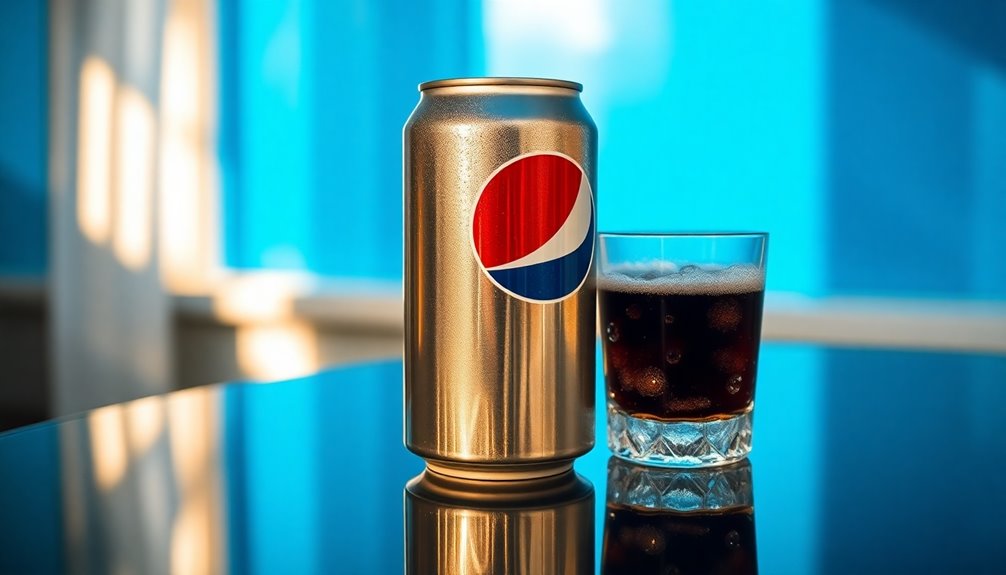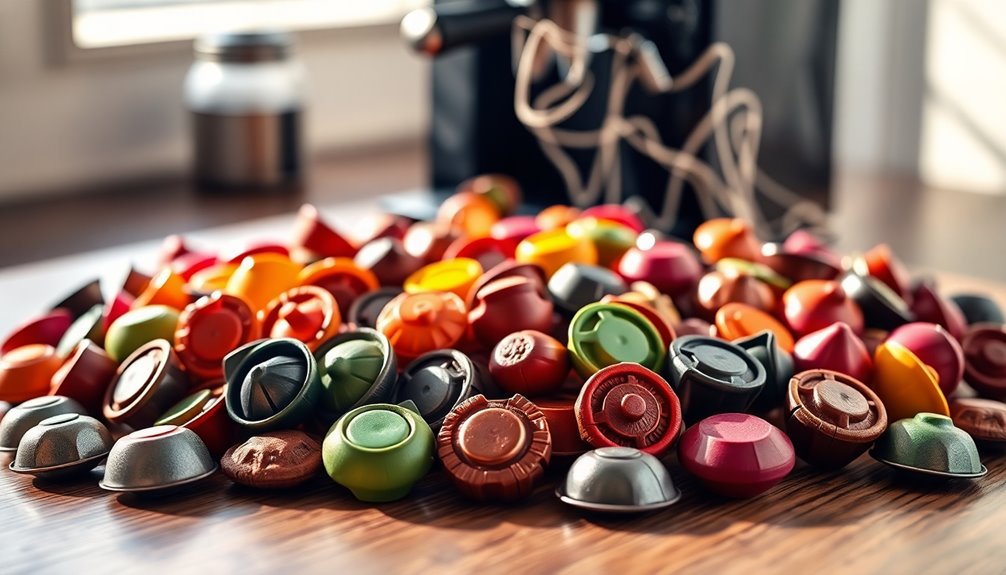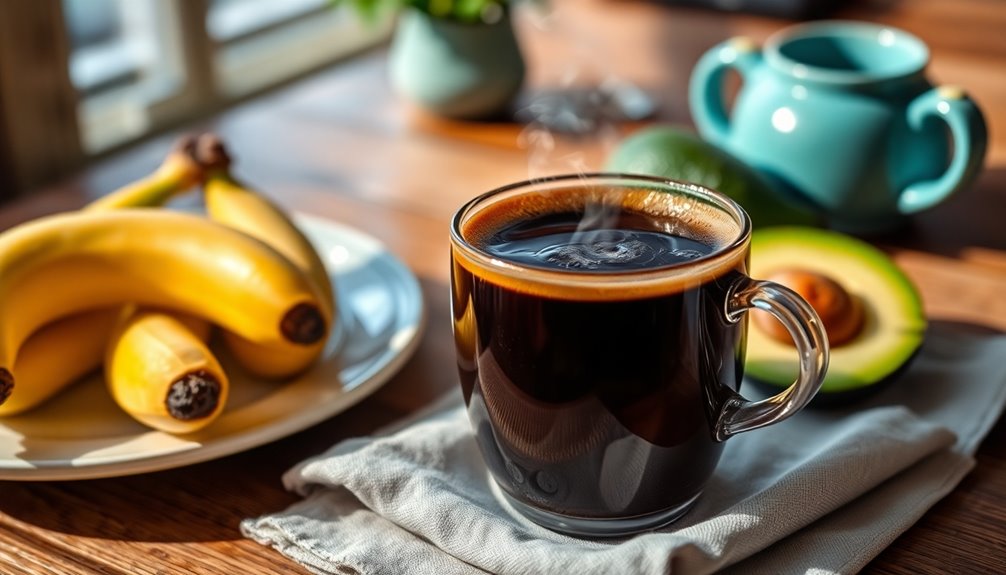Pepsi's caffeine content varies by product. A standard 12 oz can contains about 37-38 mg of caffeine, while the 16.9 oz bottle has around 53 mg, and the 20 oz bottle offers roughly 63 mg. If you're looking for a lower caffeine option, Diet Pepsi provides 35-36.7 mg per 12 oz. For a stronger kick, Pepsi Max has about 69 mg in the same serving size. It's important to reflect on how caffeine affects sleep, so it's best to enjoy Pepsi earlier in the day. Keep going to explore more about Pepsi's caffeine differences and health implications.
Key Takeaways
- A standard 12 fl oz can of Pepsi contains about 37-38 mg of caffeine.
- Pepsi Max (Pepsi Zero Sugar) has the highest caffeine content at approximately 69 mg per 12 oz serving.
- Diet Pepsi contains less caffeine, with about 35-36.7 mg per 12 oz serving, making it suitable for those monitoring intake.
- Caffeine in Pepsi can interfere with sleep, especially if consumed near bedtime; it's best to drink it earlier in the day.
- The caffeine content in Pepsi is significantly lower than that of brewed coffee, which contains 95-200 mg per 8 oz serving.
Caffeine Levels in Pepsi
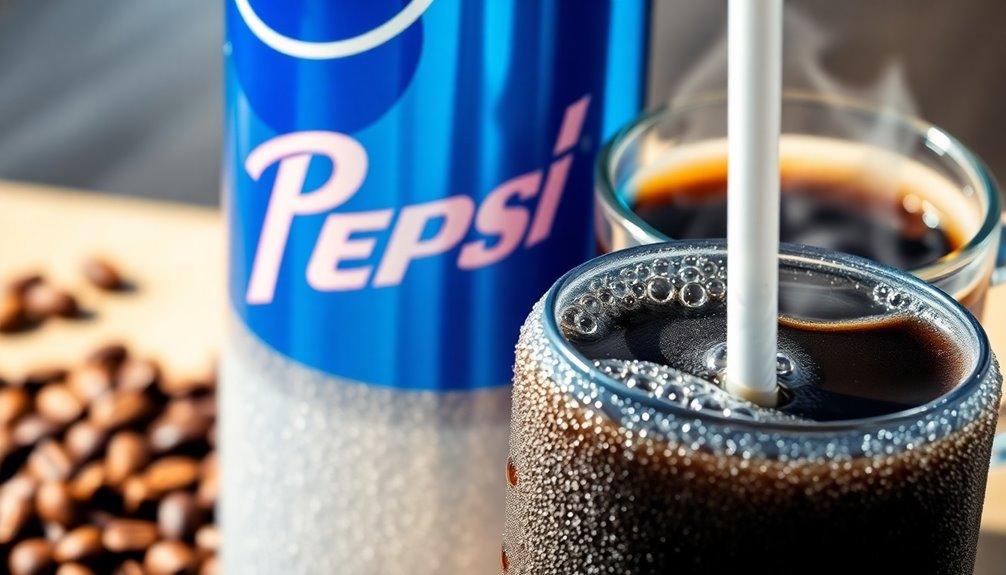
When it comes to caffeine levels in Pepsi, you'll find that a standard 12 fl oz can packs about 37-38 mg of caffeine.
If you grab a 16.9 fl oz bottle, that jumps to around 53 mg, and a 20 fl oz bottle contains about 63 mg.
This means larger serving sizes increase your caffeine intake considerably.
In comparison, Pepsi's caffeine content is lower than brewed coffee, which averages 95-200 mg per 8 oz serving.
If you prefer Diet Pepsi, it has slightly less caffeine, with around 35-36.7 mg per 12 oz serving.
For those seeking a stronger kick, Pepsi Max (Pepsi Zero Sugar) offers about 69 mg in a 12 oz serving, nearly doubling the caffeine levels found in regular Pepsi.
Impact on Sleep Quality
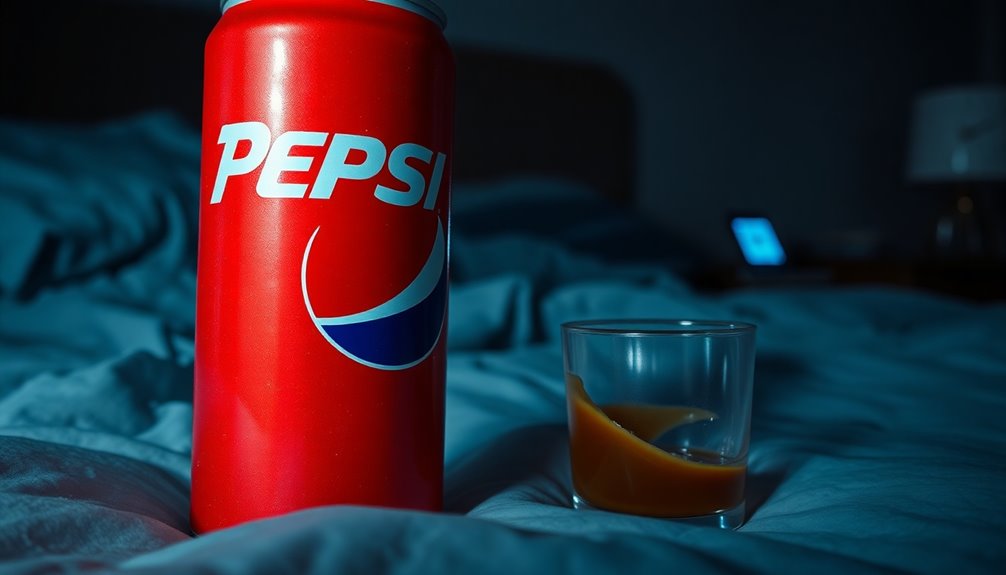
Caffeine in Pepsi can greatly affect your sleep quality, especially if you consume it too close to bedtime. With 35.34mg of caffeine in a standard 330ml can, this stimulant can interfere with your ability to fall asleep.
Individual responses to caffeine intake vary; some people may notice sleep disruptions even at lower doses. To minimize the impact on sleep quality, it's best to enjoy Pepsi earlier in the day, as caffeine can remain active in your system for hours.
If you have a low tolerance to caffeine, even this moderate amount can greatly disrupt your sleep. Additionally, the high sugar content may elevate your energy levels, making it harder to unwind and enjoy a restful night's sleep.
Comparison With Coffee
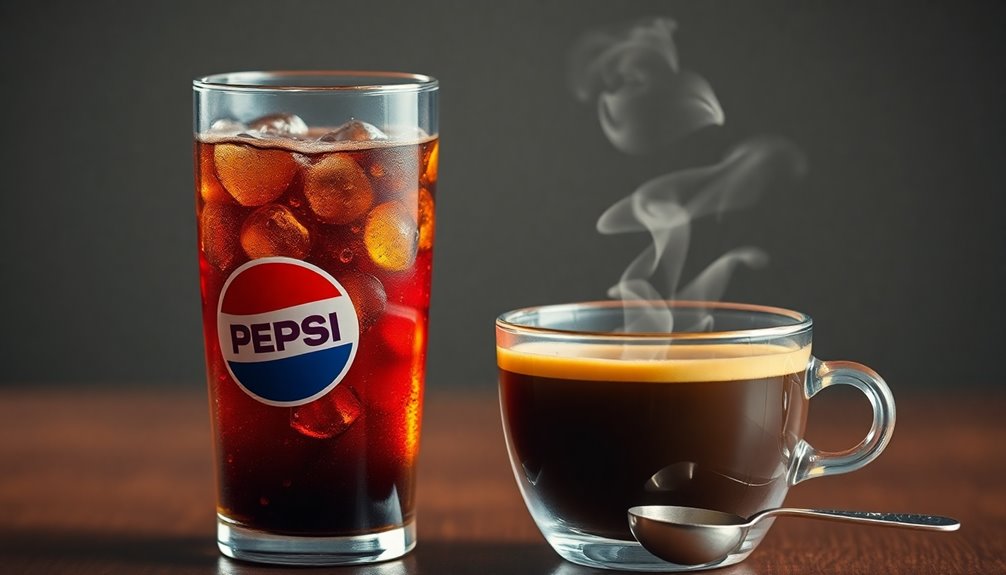
When you compare the caffeine levels in Pepsi and coffee, the difference is striking.
A 12 oz can of Pepsi packs about 37-38 mg of caffeine, while an 8 oz serving of brewed coffee can hit anywhere from 95-200 mg.
If you're looking for a caffeine boost, coffee definitely outshines Pepsi in both density and overall content.
Caffeine Levels Comparison
While you might enjoy a cold can of Pepsi for a revitalizing lift, its caffeine content pales in comparison to that of brewed coffee.
A standard 12 fl oz can of Pepsi contains about 37-38 mg of caffeine, which is considerably lower than the 95-200 mg found in an 8 oz serving of coffee.
If you're comparing a 330ml can of Pepsi, it has roughly 35.34 mg of caffeine, whereas a similar serving of black filter coffee packs around 138 mg.
With regard to caffeine density, Pepsi delivers only 10.6 mg per 100ml, while brewed coffee averages around 90 mg per 100ml.
If you're seeking a stronger caffeine kick, coffee is clearly the better choice over the caffeine in Pepsi.
Serving Size Differences
If you're considering your caffeine options, serving size plays an essential role in how much you actually consume.
A standard 330ml can of Pepsi delivers about 35.34mg of caffeine, while an 8 oz (237ml) serving of brewed coffee can pack between 95-200mg.
That's a huge difference in caffeine content! When you look at caffeine density, Pepsi offers roughly 10.6mg per 100ml compared to coffee's impressive 90mg per 100ml.
Even a larger 20 fl oz (591ml) bottle of Pepsi only gives you around 63mg of caffeine.
Caffeine in Diet Pepsi
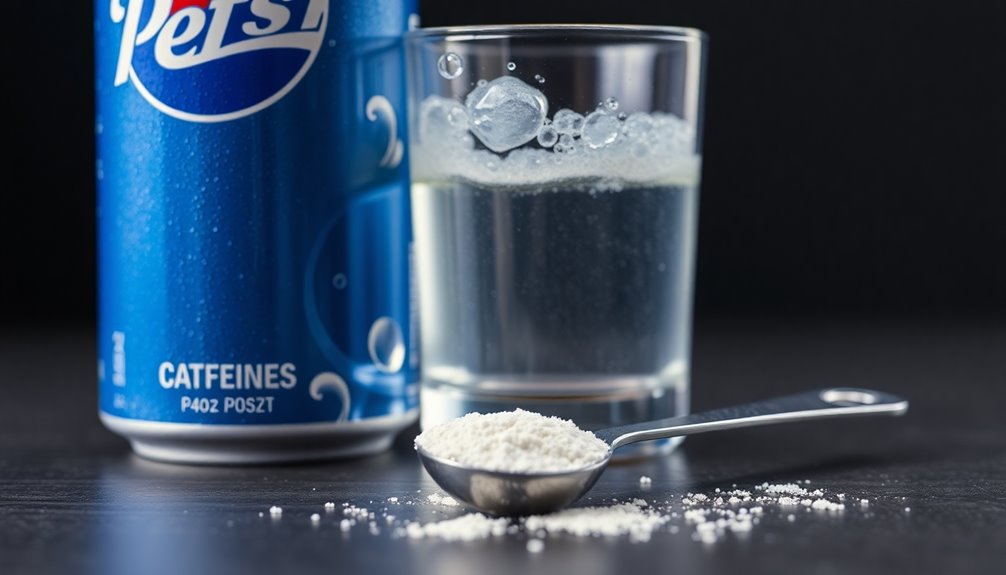
When you choose Diet Pepsi, you'll find it contains about 35-36.7 mg of caffeine per 12 oz serving, making it a bit lower than Regular Pepsi.
This lower caffeine level can be a great option if you're keeping an eye on your intake while still enjoying a flavorful beverage.
Plus, it offers a taste similar to its full-sugar version, so you won't miss out on flavor.
Caffeine Levels Compared
Diet Pepsi offers a caffeine content of approximately 35-36.7 mg per 12 oz serving, making it a lighter option compared to Regular Pepsi.
If you're keeping an eye on your caffeine intake, this beverage provides a consistent and moderate level of caffeine across servings. In fact, when you compare it to Diet Coke, you'll find that Diet Pepsi has even less caffeine, making it a great choice for those who are caffeine-sensitive.
Despite having lower mg of caffeine than Regular Pepsi, Diet Pepsi retains a similar taste profile, ensuring you won't miss out on flavor.
Health Considerations
While enjoying Diet Pepsi, it's important to contemplate how its caffeine content fits into your overall health and lifestyle.
With approximately 35-36.7 mg of caffeine per 12 oz serving, Diet Pepsi offers a lower-caffeine option compared to Regular Pepsi, which has slightly more. This makes it appealing if you're monitoring your caffeine intake but still want a flavorful cola.
Keep in mind that Diet Coke contains even more caffeine, so you have choices based on your preference. The reduced caffeine content can help you enjoy your drink without overloading on caffeine, aligning with your health considerations.
Ultimately, balancing enjoyment with mindful consumption is key to incorporating Diet Pepsi into your routine.
Caffeine in Pepsi Max
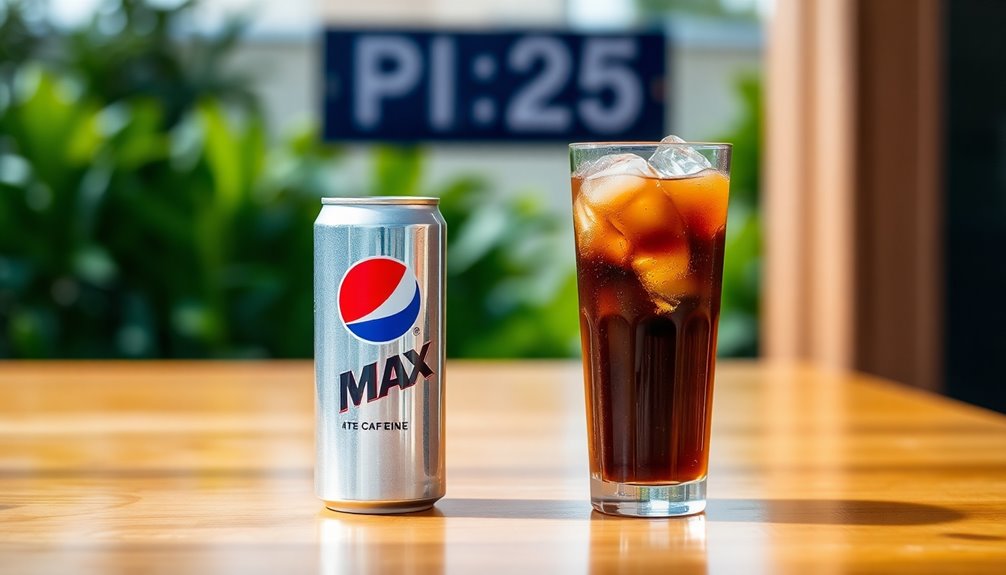
Pepsi Max packs a punch with its caffeine content, offering about 69 mg per 12 oz serving. This makes it a stronger option compared to Regular Pepsi, which contains only about 37-38 mg of caffeine in the same size.
If you're looking for a beverage that gives you an extra boost, Pepsi Max is a solid choice. Some sources even claim that the caffeine content could reach up to 107 mg, depending on the region and formulation.
It's essential to highlight that the caffeine level may vary slightly, so checking the product label is a good idea.
Whether you need a pick-me-up for work or a revitalizing drink for leisure, Pepsi Max delivers with its higher caffeine content.
Health Guidelines for Caffeine
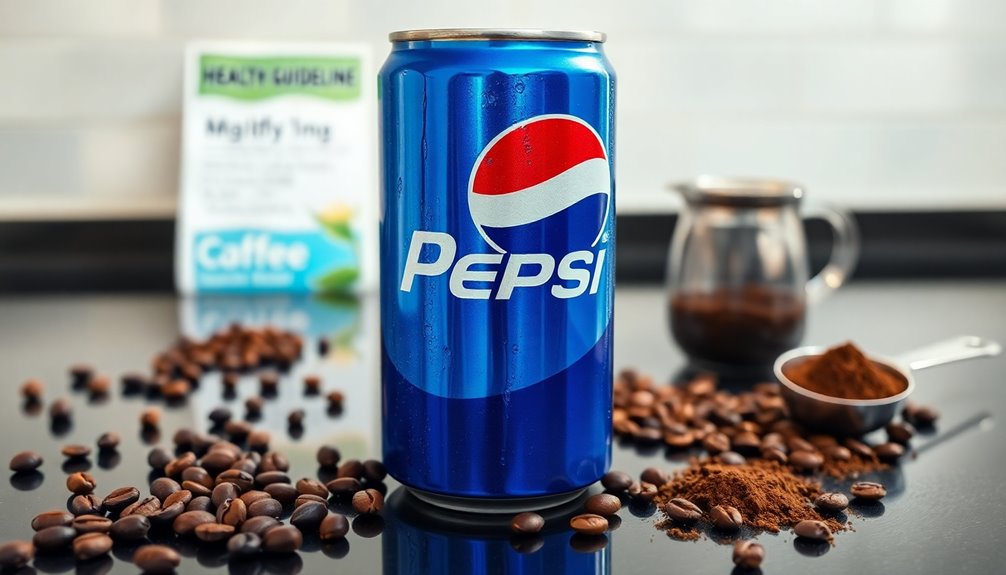
Understanding health guidelines for caffeine is crucial, especially since moderate intake can be safe for most healthy adults. Generally, up to 400 mg per day is recommended. However, some individuals, like pregnant women or those with specific medical conditions, should consult healthcare providers about their limits. Too much caffeine can cause restlessness, irritability, and sleep issues, so it's important to monitor your overall consumption of caffeinated beverages, including Pepsi. If you're a heavy caffeine user, remember that stopping abruptly can lead to withdrawal symptoms, so consider reducing your intake gradually.
| Group | Daily Limit | Notes |
|---|---|---|
| Healthy Adults | Up to 400 mg | Safe for most individuals |
| Pregnant Women | Consult Doctor | Individualized recommendations |
| Medical Conditions | Consult Doctor | Varies by condition |
| Caffeine Withdrawal | Gradual Cut | Avoid abrupt cessation |
Understanding Caffeine Sources
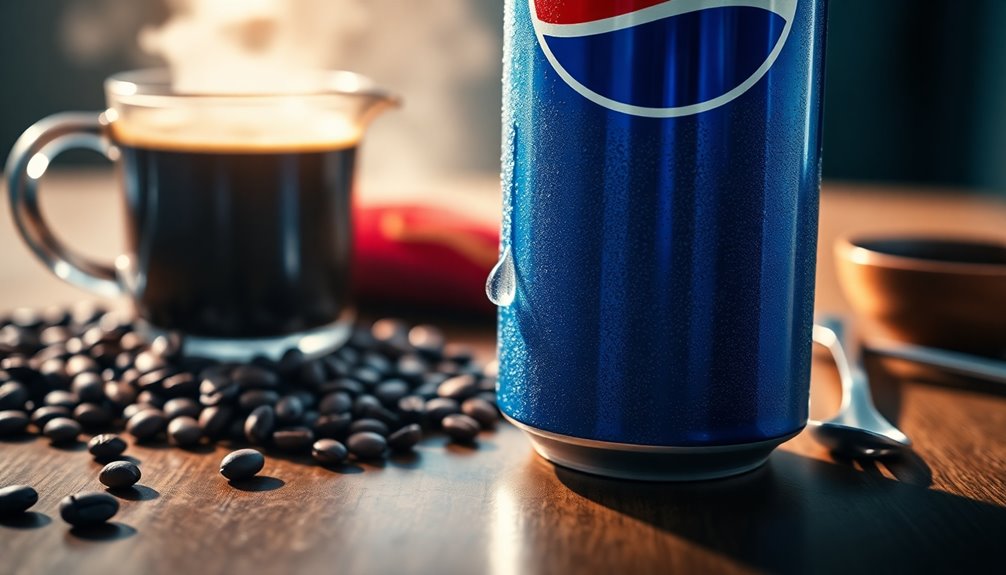
Caffeine is an integral part of many people's daily routines, often found in various beverages and foods. It's a naturally occurring stimulant derived from sources like coffee beans, tea leaves, kola nuts, and cocoa beans.
In the case of Pepsi, the caffeine content is about 35.34 mg per 330ml can. This is much lower than coffee, which can have between 95 to 200 mg per 8 oz serving. Pepsi contains added caffeine to enhance its flavor, providing a subtle bitterness that balances its sweetness.
Depending on the product, Pepsi Max, for instance, can contain up to 69 mg of caffeine in a 12 oz serving. Understanding caffeine sources like Pepsi helps you manage your overall intake effectively.
Frequently Asked Questions
Is There a Lot of Caffeine in Pepsi?
If you’re wondering whether there’s a lot of caffeine in Pepsi, it really depends on what you’re comparing it to. For example, compared to other colas, Pepsi has a similar amount of caffeine. However, compared to coffee or energy drinks, it has significantly less. In terms of soft drinks and health concerns, it’s important to be mindful of the overall sugar and calorie content in addition to caffeine levels. Some people may be more sensitive to caffeine than others, so it’s always a good idea to consume any caffeinated beverage in moderation.
A standard 12 oz can contains about 37-38 mg of caffeine, which is lower than many coffee beverages.
If you opt for Pepsi Max, you'll find nearly double that amount at around 69 mg.
Is the Caffeine in Pepsi Enough to Keep You Awake?
Whether the caffeine in Pepsi's enough to keep you awake really depends on your personal tolerance.
With only about 37-38 mg of caffeine in a 12 oz can, it's considerably less than what you'd get from coffee.
If you're sensitive to caffeine, you might feel a little boost, but if you're looking for a strong stimulant effect, Pepsi probably won't do the trick.
Just be cautious, as it can still affect your sleep later on!
Which Has More Caffeine, Coffee or Pepsi?
When comparing caffeine content, you've gotta know that coffee considerably outpaces Pepsi.
A standard 12 oz can of Pepsi has about 37-38 mg of caffeine, while an 8 oz cup of brewed coffee packs anywhere from 95 to 200 mg.
If you're looking for a serious caffeine boost, coffee's your best bet.
Pepsi can give you a little lift, but it won't match the energizing kick that coffee provides.
Which Pepsi Has the Least Caffeine?
If you're searching for the quietest whisper among the Pepsi cans, search no more than Diet Pepsi or Pepsi Made With Sugar.
Both offer a gentle caress of caffeine, sitting at around 35-36 mg per 12 oz serving. They're perfect if you want to enjoy a revitalizing sip without the buzz of stronger options.
Conclusion
Now that you know about the caffeine content in Pepsi, think about how it affects you. Will that late-night can keep you tossing and turning? Or perhaps you're curious about how it stacks up against your morning coffee? As you sip on your favorite drink, remember the guidelines and weigh your choices. The next time you reach for a Pepsi, pause for a moment—what's in that can might just surprise you.
